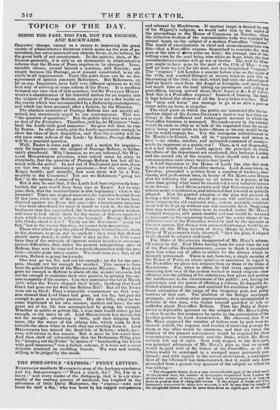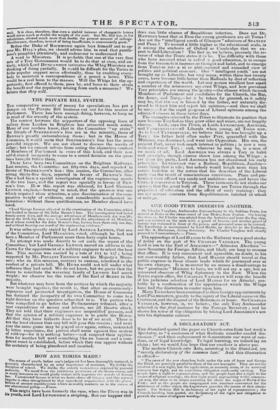THE POST-OFFICE "EXPRESS:" PENNY LETTERS.
EVERYBODY recollects MATHEWS'S story of the hackney-coachman and the foot-passenger —" Want a coach. Sir ? No, I'm in a hurry " and every reader of the Antiquary, that is to say nine- tenths of the reading portion of mankind, has laughed at the adventure of little Davie Mailsetter, the "express—man and borse for half a day," who was beset by his ragged companions for and released by Monkbarns. If another laugh is desired by any of his Majesty's subjects, we would refer him to the report of the proceedings in the House of Commons on Tuesday, when the collective wisdom of the representative body was eng aged several hours on the subject of a modern Post-office " express." The result of examinations in chief and cross-examinations was this—that a Post-office express despatched to overtake the mail goes at the rate of wen miles an hour ; the average rate of tr. yelling even by the mail being nine miles an hour, while the best accommodation-coaches will go ten or twelve. The writ for Mrs. gow ought to have gone by the mail of the 17111 of May : it was half an hour too late for the mail, and was despatched " express." The " express " left London a quarter before nine on the night of the 17th, and reached Glasgow at twenty minu; he advantage of the evening of the 1eth; the mail, which had only half an hour's start from the Angel at Islington, and must have lost much time on the road taking up passengers and ealling at post-offices, having arrived about three hours at d a It df byore. And this is a Post-office express ! Instead of beating the mail, it lags behind the slowest of all the heavy-laden coaches. How the " man and horse " can manage to go at so slow a pace as seven miles an hour, is singular.
The chief point on which the public are interested (for the mediate object of Sir JAMES GRAHAM'S motion was less than no. thing) is the inefficient and extravagant manner in which the Post-office business is managed. No coach-owner in the country would be such an idiot as to talk of the regulated time for an ex- press being seven miles an hour—fifteen or twenty would be the rate he would engage for. Yet the enormous establishment in St. Martin's-le-Grand, with all its " appliances and means to boot "—its clerks, coaches, and unlimited command of money sends its expresses at a gentle trot I Then, is it not disgraceful, and a tact which speaks loudly against the principle on which the affairs of the department are conducted, that between London and the second city of the empire, there should only be a mail communication once every twenty-four hours?
A brief discussion in the House of Lords has also this week drawn our attention to Post-office matters. Lord Astir:wee" on Tuesday, presented a petition from a number of bankers, mete chants, and professional men, in favour of Mr. ROWLAND Iltais plan for reducing the postage on all letters to a penny, at the same time giving what must he considered a very valuable opinion in its favour. Lord DUNCANNON said that Government had the scheme under c.insideration, and intimated that it would be partially adopted. Now the partial adoption uf the plan will prevent its having a fair trial. Many stupid persons will continue to send their letters in the old expensive way, and all unwieldy establish- ment will be kept up without any real necessity for it. Supposing that nine-tenths of the letters were to, warded under Mr. limes stamped wrappers, still much trouble and cost would be incurred hi transmitting the remaining tenth, and the entire blame of the additional cost at the Past-office would be laid by the ignorant on the new system. But then,a vast amount of patronage would be re- tained, on the Whig system of doing things by halves. The Duke of WELLINGTON truly observed, " that the plan, if adopted at all, should be adopted uniformly."
The Duke of RICHMOND disapproved of Mr. Htts's scheme. Of course he did. That Duke having been for sonic time the tool of the Post-office Bumbureaucracy, seems to think it incumbent upon him when out of office to- stickle for the abuses which he formerly patronized. There is not, however, a single member of the house of Peers on whose opinions or assertions in regard to the Post-office we place less reliance than on those of the Duke of RICHMOND. For, when in office, he had every opportunity of observing how very ill the system worked in many respects—how offensive was the jobbing of his subalterns, how gross and uniform the indifference to the convenience of the public : yet, having the opportunity and the power of effecting a reform, he doggedly de-
fended almost every abuse, and confined his exertions to insigni- ficant extensions of the range of the twopenny post, and paltry matters of that sort. The abolition of the foreign newspaper monopoly, and certain other improvements, were accomplished in defiance of this man, who deems himself qualified to talk ex cathedra about Post-office Reform. That the Duke of Rica' MOND is deplorably ignorant on the subject of Mr. Iitar.'s plant is clear front the few sentences he spoke on the presentation of the London petition by Lord Asunueeore. He observed, that if as Mr. lItu. supposed the number of letters sent by post were in- creased sixfold, the expense and trouble of receiving postage for them at the office would be enormous, and that six times the number of the present conveyances would be required for their transmission,—a circumstance said the Duke, which Mr. Hat. entirely left out of sight. Now with respect to the first part, one principal advantage of Mr. MIA's plan is, that no money would be paid with or for letters at the Post-office, as all the letters would to enveloped in a stamped paper previously pur- chased ; and with regard to the second observation, a correspon- dent of the Chronicle has demonstrated, that it could only have proceeded from a person very ignorent of the subject on which he was talking- " The chargeable letters form a very inconsiderable part of the whole mad. At the present time, the number of newspapers despatched from Loudon far weed* the number of letter,; and the weight of newspapers is at least mt times as great as that of chargeable letter*. lIthe weight of franks and Pars liamentary doeumems be taken into account, it will be seen that the weight f the chargeable letters cannot be more than about an eighth part of the whole It is clear, therefore, that even a sixfold increase of chargeable lettel would not so much as double the weight of the mail. But Mr. Hill has, in his calculations, allowed much more than double the present amount of mileage. Hisallowauce, thirefore, instead of being insufficient, is unnecessarily great." Before the 'Duke of RICHMOND again lays himself out to op- pose Mr. HILL'S plan, we should advise him to read that gentle- man's pamphlet attentively, and endeavour to understand it. A word to Ministers. It is probable that one of the very first acts of a Tory Government would be to do that at once, and en- tirely, which Lord Derscssinvore intimates the Whig Ministers are thinking of doing rartially. It would be difficult for the Tories to bribe popular support more effectually, than by enabling every- body to maintain a correspondence at a penny a letter. This would be a real boon to the masses. Will the Whigs let the op- portunity, first offered to them, pass by, and leave to their rivals the benefit and the popularity arising from such a measure? We believe that they will.



























 Previous page
Previous page